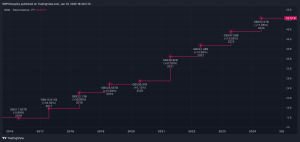Investing in FTSE 250 dividend growth stocks can provide a steady income and capital gains as cash rewards are steadily hiked. It’s a combination that can protect against inflation and provide a strong and stable return over time.
This company’s tipped to grow dividends by double-digit percentages over the next couple of years at least. Here’s why I’d buy it if I had cash on hand to invest.
A top property stock
Investing in residential property’s one of the safest ways to make a second income, in my book. Demand for accommodation remains stable regardless of economic conditions, providing landlords with a steady stream of income.
But I wouldn’t think about buy-to-let as an option. Higher taxes, stricter mortgage regulations, and increased maintenance and admin costs make it less profitable (and more complex) than I’d like.
Instead, I’d buy shares in one of the UK’s residential-focused property stocks. For investors seeking reliable dividends, I don’t think Grainger (LSE:GRI) can be bettered.
This FTSE 250 firm is Britain’s largest residential landlord, with more than 10,000 properties on its books. Its aim is to distribute 50% of net rental income in the form of dividends, which — supported by solid growth in UK rents — has led to an impressive rise in shareholder payouts.
Indeed, the business lifted its interim dividend 11% for the last financial year to September. It’s expected to announce another full-year hike when final results are released on 21 November.
Good fundamentals
Encouragingly for investors, rents continue to march higher as the sector’s supply shortage drags on, which bodes well for dividends this year and beyond.
According to Rightmove, rents outside London struck “a 19th consecutive quarterly record of £1,344 per calendar month” in October. Tenant costs in the capital have also hit new peaks of £2,694 a month.
This means annual rental growth inside and outside London was 2.5% and 5.2% respectively.
The stronger performance ex-London is especially good for Grainger, as most of its homes are located outside the capital. It has a presence in 14 British cities, a figure it plans to eventually increase to 23.
Rapid dividend growth
Against this backcloth, City analysts expect dividends to continue rising strongly over the short-to-medium term.
| Year | Dividend per share | Dividend growth | Dividend yield |
|---|---|---|---|
| 2024 | 7.31p | 10% | 3% |
| 2025 | 8.24p | 13% | 3.4% |
| 2026 | 9.20p | 12% | 3.8% |
Dividends are tipped to expand at a rapid pace too. And as a consequence, the yields on Grainger shares rise rapidly.
There are some risks to future earnings and dividends beyond the near term. More specifically, a broader rise in rental property supply could dent overall returns by dampening rental growth.
On this front, Labour’s plan to build 1.5 new homes between now and 2029 could be an unfavourable gamechanger.
Yet on balance, I believe Grainger’s still an attractive stock for passive income. Its large (and expanding) position in an ultra-defensive market could deliver solid dividends for years to come.
This post was originally published on Motley Fool







